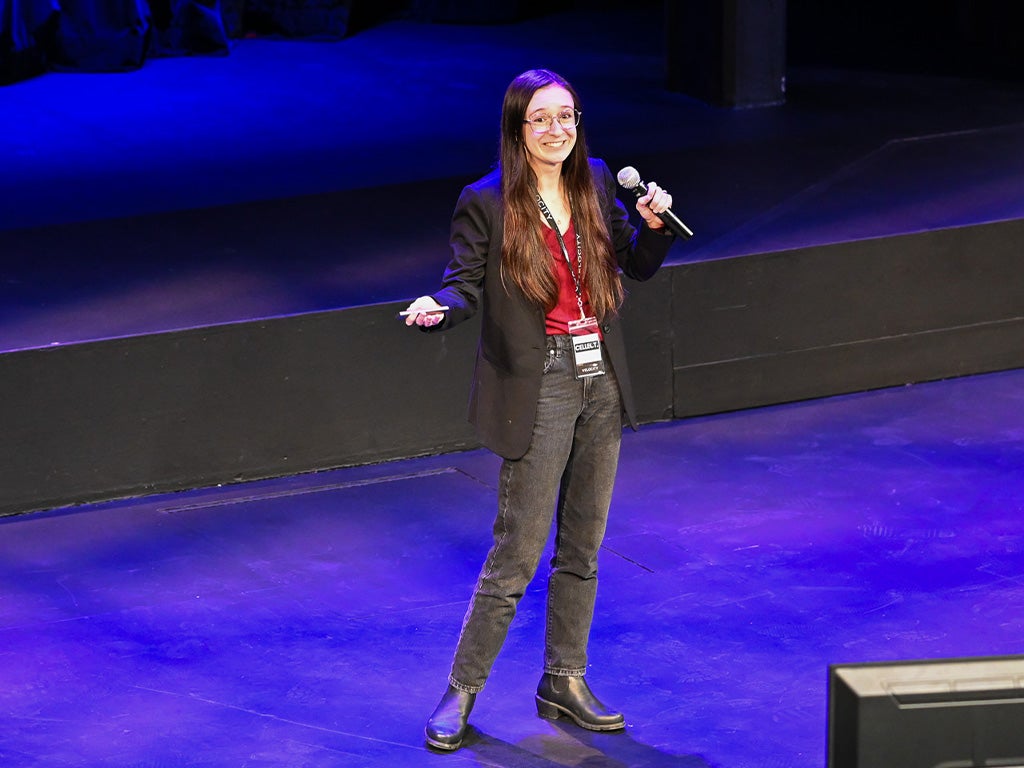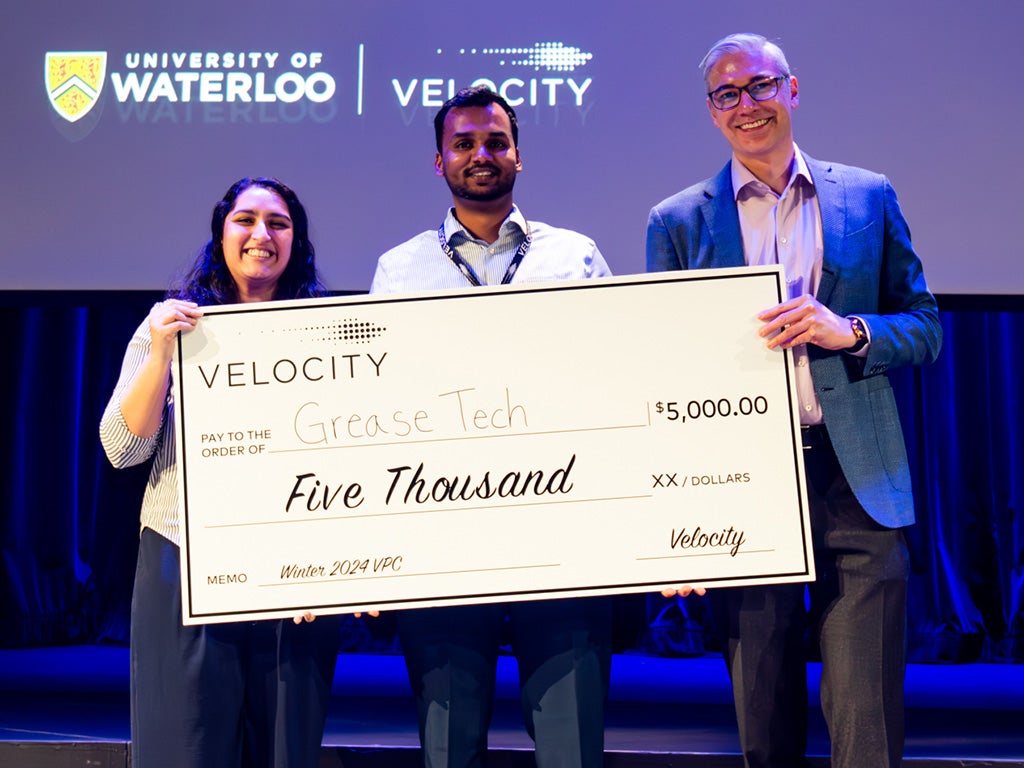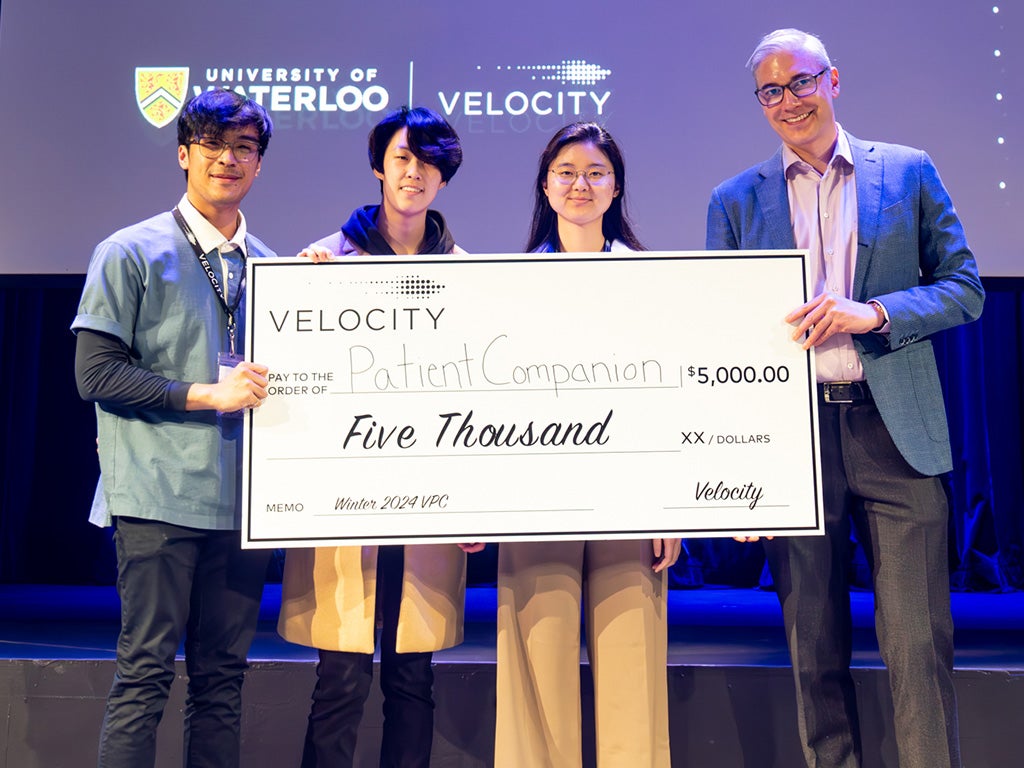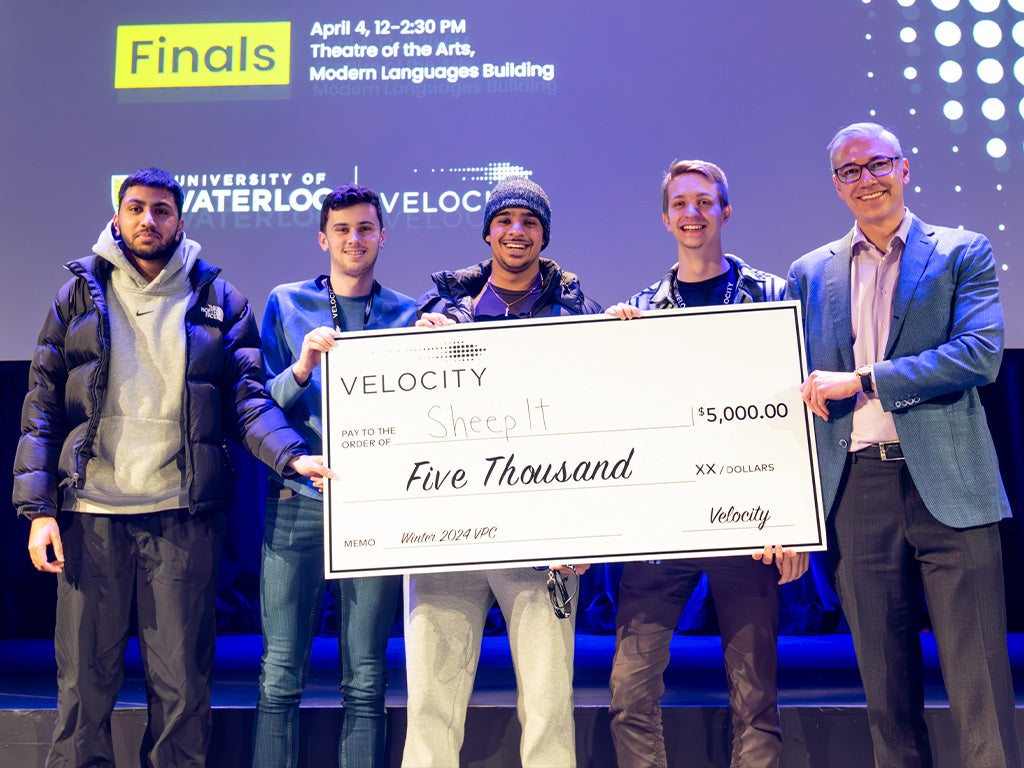
Velocity Pitch Competition unveils top innovators
With grants at stake, students pitch inventive startup ideas to bring their entrepreneurial visions into reality

With grants at stake, students pitch inventive startup ideas to bring their entrepreneurial visions into reality
By Jordan Flemming University RelationsThe Winter 2024 Velocity Pitch Competition saw a big turnout, attracting more than 100 student applications from campus. Narrowing down from a competitive initial pool, 26 teams emerged to compete in the semi-finals, leading to the final showdown of eight standout finalists.
On April 4, the University community rallied around the final teams, vying for more than $20,000 in grants through a fierce pitch competition. The startups — Automax Ai, CELLECT., Grease Tech, NewGen Health, OrthoFlexion, PatientCompanion, SheepIt and Wygo — each delivered a three-minute pitch of their business ideas to a panel of distinguished judges in front of a live audience.
Through programs like these, Velocity is transforming the way businesses are built by creating resources, building community and breaking down barriers for founders to bring to market solutions that address cross-disciplinary challenges.

CT Murphy delivers pitch for CELLECT.
CT Murphy, a master’s student in Chemical Engineering pitched her startup CELLECT. which offers innovative technology using nanomaterials in menstrual products to diagnose HPV and cervical cancer using menstrual blood, potentially eliminating the need for Pap smears.
“1.2 billion menstruating women worldwide are at risk of contracting HPV. Most of these women postpone or forgo the main screening method for this because of the medieval-looking torture device that is used in a Pap smear,” CT Murphy said.
Prior to this competition win, Murphy was awarded the Waterloo Institute for Nanotechnology (WIN)-Velocity scholarship for their project. They also received funding from Velocity’s Up Start Program and Cornerstone Program.
Murphy's persuasive presentation for CELLECT. captivated the audience and earned them the people's choice award, boosting their take home grant by an extra $500.

Left to right: Grease Tech co-founders Minaal Butt and Jesurun Ramesh accept grant from John Dick
Minaal Butt and Jesurun Ramesh, both Master of Business, Entrepreneurship and Technology students, are changing how the manufacturing industry maintains its machinery. Their startup, Grease Tech, has developed hardware and software for manufacturers to more accurately lubricate machine bearings, saving them time and money.
“Grease Tech is filling a significant industry gap with our solution. It proactively ensures proper bearing lubrication, addressing the root cause of failures, unlike complex systems that only serve half the market and do not do a good job,” Ramesh explained.
Another advantage of Grease Tech’s innovation is that manufacturers can install the sensors and use the software with little to no downtime.
“With sensors on each bearing, our platform signals lubrication status, making scheduling and maintenance easier for companies. This means Grease Tech is tapping into a $24 billion North American market opportunity,” Ramesh said.

Left to right: PatientCompanion founders Ethan Alvizo, Valerie Liu and Christy Lee accept cheque from John Dick
PatientCompanion introduces a system enabling patients to submit specific requests that are automatically prioritized for nursing staff. The platform intelligently routes non-medical requests, such as those for water or blankets, to personal support workers or volunteers. This innovation promises to alleviate the workload of nurses in hospitals and long-term care facilities.
“On average, nurses are assigned between five to nine patients each, where roughly 56 per cent of requests made by patients are non-urgent requests,” said Christy Lee, a Biomedical Engineering student pitching for her team. “As a result, three per cent of the time nurses would forget to come back after asking what the patient needs, while 10 per cent of requests get cancelled.”
This was PatientCompanion’s second time pitching in the Velocity Pitch Competition. Since their last pitch the startup has gone through further product validation trials and was ready to give it another go.
“The Velocity team has given continuous support, answering questions, helping us prepare our pitches and even helped us set up and plan out our business — it’s been really helpful,” Lee said after nabbing one of the top spots.

Left to right: Team SheepIt comprised of Noumaan Kaleem, Nathan Philippon, Saahibdeep Dhaliwal and Josiah Plett accept grant from John Dick
"SheepIt is developing a tech solution for Canadian sheep farmers, who currently rely on pencil and paper for data tracking,” said Computer Science student Josiah Plett, pitching on behalf of his team.
Existing solutions for this space are outdated or are not user-friendly. SheepIt offers a modern, mobile-friendly and tailored solution for sheep farms with smaller flocks.
“Our aim is to support hobbyist and specialist sheep farmers in monitoring traits and production, filling a niche that existing solutions — aimed only at industrial farms — do not address," Plett explained.
The judges had a tough time determining the winners.
“There is no question about it, every team here deserved to be in the final and we want all these startups to keep going, keep solving problems, keep showing traction and just make it happen,” said judge Mila Banerjee, CEO and founder of Kitchener-based Pronti AI.
Finals panel of judges
The Velocity Pitch Competition exemplifies the University of Waterloo's dedication to nurturing entrepreneurial minds and advancing market-changing ideas.
At Waterloo, whether you're just dipping your toes into entrepreneurship or already steering a startup, there's a supportive program tailored for you. Discover a wealth of opportunities in our innovation centres, through specialized programs, comprehensive courses and a variety of extracurricular activities.

Read more
GreenHouse awards more than $14,000 to five student founded ventures making an impact towards several UN Sustainable Development Goals

Read more
Teams of engineering students competed for investments in their fourth-year design projects

Read more
Kicking off Global Entrepreneurship Week by looking at some Waterloo founded companies making a global impact
The University of Waterloo acknowledges that much of our work takes place on the traditional territory of the Neutral, Anishinaabeg, and Haudenosaunee peoples. Our main campus is situated on the Haldimand Tract, the land granted to the Six Nations that includes six miles on each side of the Grand River. Our active work toward reconciliation takes place across our campuses through research, learning, teaching, and community building, and is co-ordinated within the Office of Indigenous Relations.